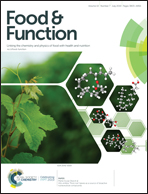Docosapentaenoic acid (DPA, 22:5n-3) ameliorates inflammation in an ulcerative colitis model†
Abstract
The anti-inflammatory profile of DPA was investigated via a dextran sulphate sodium (DSS)-induced colitis model, and was also compared with those of EPA and DHA. The results showed that DPA could significantly reduce (stronger than EPA and DHA) the disease activity index score, macroscopic appearance score, colon shortening, histological assessment, and myeloperoxidase accumulation in the colon. In addition, DPA also inhibited the abnormal production and mRNA expression of pro-inflammatory cytokines, namely tumor necrosis factor (TNF)-α, interleukin (IL)-1β and IL-6 and improved the production and expression of an anti-inflammatory cytokine, IL-10. Furthermore, the molecular mechanisms underlying these effects were also explored through the synthesis pathway of eicosanoids. DPA could inhibit the synthesis of leukotriene B4 (LTB4) and prostaglandin E2 (PGE2) more greatly while differences of cyclooxygenase (COX) and 5-lipoxidase (LOX) contents in these three groups were not significant. We ascribed these effects to the easier incorporation of DPA into inflammatory cells leading to the decrease in the substrate for the synthesis of pro-inflammatory eicosanoids (PGE2 and LTB4). Besides, DPA-derived mediators might also be involved.



 Please wait while we load your content...
Please wait while we load your content...